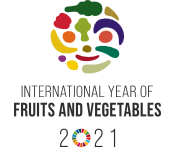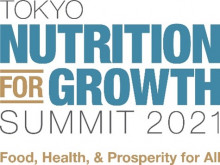Fruits and Vegetables – Research and Action Opportunities for Human and Planetary Health
The year 2021 is designated as the International Year of Fruits and Vegetables by the United Nations. Fruits and vegetables are rich in edible fibers, vitamins and minerals, and are essential in healthy and balanced diets. As highlighted in the 2019 Planetary Health Diet report by the EAT-Lancet Committee, they are also important food groups to focus in the recent food systems transformation because of their relatively low environmental footprints compared to animal source foods, as well as their significant contribution to improving the lives of local people involved in the value chain.
In the past, global research on fruits and vegetables was more limited as compared to major cereals such as rice, maize and wheat, because the emphasis was on meeting caloric needs rather than on nutritional balance. Moreover, investments in research were mainly in high income countries or to high-valued globally traded commodities such as banana. More recently, however, there are emerging opportunities to apply new and advanced technologies, such as biosciences and smart technologies to research on fruits and vegetables. Science, technology and innovation (STI) will play a crucial role in making fruits and vegetables more nutritious, affordable, utilizable and safe, as well as good for the environment.
On the other hand, many low-income countries are still facing many challenges in fruit and vegetable production and distribution systems. Fruits and vegetables are perishable, and it is often difficult to maintain the quality and safety, which can lead to food loss and waste. In addition, they are in general more expensive than staple crops and thus remain out of reach for the majority of resource-constrained populations. There are also missed opportunities to utilize local fruits and vegetables, so-called ‘orphan’ crops. According to an estimate based on publicly available data in 2009, the global supply of fruits and vegetables is 22% short of the WHO recommended intake. This gap varies from 58% in low-income countries to 13% in upper-middle-income countries, and is projected to widen further by 2050, with the largest insufficiencies seen in low-income countries, rising as high as 70% (Siegel 2019).
In this Symposium, we will focus on fruits and vegetables research and action opportunities contributing to health, development and environmental outcomes, with a specific focus on low-income countries. On the supply side, a range of new and advanced technologies such as genome editing and smart agriculture will be reviewed with emphasis on their potentials to utilize nutritious, resilient or high value traits of fruits and vegetables. Research and action opportunities focusing on enhancing demand and on enabling policy factors will be reviewed as well. Furthermore, the global supply and demand gaps in fruit and vegetable intakes will be analyzed in the context of issues and areas requiring R4D, investment and policy intervention, especially in low-income countries. Through this Symposium, we hope to provide a venue for discussions on how we can contribute to human and planetary health through the increased consumption of fruits and vegetables, while responding to local needs.
This symposium is an official side event of the Tokyo Nutrition for Growth Summit 2021.
The symposium video is now archived on the JIRCAS YouTube channel.
https://www.jircas.go.jp/en/program/proc/blog/20211214
(Date and time are Japan Standard Time)
- Organized by
-
Japan International Research Center for Agricultural Sciences
- Co-organized by
-
Food and Agriculture Organization of the United Nation, Liaison Office in Japan
- In cooperation with
-
National Agriculture and Food Research Organization (NARO)
- Date
-
2021-12-6(Mon) 16:00~17:45 (JST)
- Place
-
Online
- Program
-
MC: MITSUGI Hiroto, Senior Advisor, FAOTime
Agenda
Speakers
16:00-16:10
Opening Remarks
KOYAMA Osamu
President, JIRCASHIBI Eriko
Director, FAO Liaison Office of Japan16:10-16:15
Introduction
NAKASHIMA Kazuo
Program Director, Food, JIRCAS16:15-16:30
Setting the stage:
The role of fruits and vegetables for planetary and human healthIsmahane ELOUAFI
Chief Scientist, FAO16:30-16:45
High GABA tomato, a case study to apply new breeding technologies to fruits and vegetable improvement
EZURA Hiroshi
Professor, University of Tsukuba16:45-17:00
Production forecasting systems for stable supplies of cabbages and lettuces
SUGAHARA Koji
Group Leader, Institute of Vegetable and Floriculture Science, NARO17:00-17:10
The status and prospects of production, distribution and consumption of fruits and vegetables in the global vs. local contexts
SHIRATORI Sakiko
Senior Researcher, JIRCAS17:10-17:25
Moving forward:
Fruit and vegetables research and action prioritiesMarco WOPEREIS
Director-General, World Vegetable Center17:25-17:40
Q&A
17:40-17:45
Closing Remarks
YAMAMOTO Yukiyo
Vice President, JIRCAS - Registration period
-
- (JST)
- Registration
-
Registration deadline:(JST)NoticeRegistration was closed.
- Registration fee
Free
- Archive
-
https://youtu.be/ne5lfDP_FLM (1/5)
https://youtu.be/MtKxyQ4iwmk (2/5)
https://youtu.be/1Qyn_BM_dLY (3/5)
https://youtu.be/mSkYyX9koYw (4/5)
https://youtu.be/o2xCaJ25YLg (5/5) - Report
-
Report on the Symposium “Fruits and Vegetables - Research and Opportunities for Human and Planetary Health”
Information and Public Relations Office, JIRCAS
-
Address1-1 Ohwashi Ibaraki Tsukuba, JAPAN
-
Telephone+81-29-838-6727
-
Emailevent-jircas@ml.affrc.go.jp
-
URLhttps://www.jircas.go.jp/ja/form/inquiry


